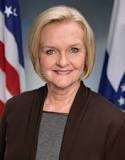 |
| U.S. Senator Claire McCaskill |
Sen. Claire McCaskill (D-MO) is all riled up about drug pricing, saying last month that she would lead a probe from the Senate Special Committee on Aging to investigate steep price increases from companies such as Turing Pharmaceuticals. The Senate committee recently held its first hearing and perhaps to no one's surprise, things got pretty heated.
McCaskill and witnesses including doctors and pricing experts called out Turing for raising the price of its toxoplasmosis drug, Daraprim, Bloomberg reports. In August, the company bought the med and jacked up its price to $750 a pill from $13.50 a pill, setting off a firestorm of criticism from lawmakers, presidential hopefuls and the public.
During the hearing, McCaskill also took aim at Turing CEO Martin Shkreli's spending habits. "I noticed in the morning paper, this is the same guy who thought it was a great idea to pay millions of dollars for the only existing album of the Wu-Tang Clan," McCaskill said, as quoted by Bloomberg. Earlier this year Shkreli, to whom McCaskill referred as "Mr. Wu-Tang," shelled out $2 million for the only copy of an album from the renowned rap group.
But "the Turing example of several thousand percent price increase is only the tip of the iceberg" when it comes to drug pricing, Gerald Anderson, director of the Center for Hospital Finance and Management at the Johns Hopkins Bloomberg School of Public Health, said in written testimony during the hearing. "Many other generic companies are doing the same thing," Anderson pointed out, often negatively impacting patients' health.
Valeant ($VRX) has also come under fire for its dramatic price increases. The Senate probe is looking into the company's prices for cardiac drugs Isuprel and Nitropress, which have shot up 525% and 212%, respectively. Those kinds of price hikes raise "troubling questions about whether companies like Turing and Valeant are taking advantage of the patients who depend on their products for survival," McCaskill said, as quoted by Bloomberg.
Pharma companies did not testify at the hearing, but Valeant and Turing are both standing by their pricing practices. Valeant sets prices "based on a number of factors, including the cost of the development or acquisition of a drug, the availability of substitutes or generics, and the benefits it offers versus alternative treatments that might be more costly," spokeswoman Laurie Little told Bloomberg in a written statement. And the company offers "significant volume discounts" for hospitals that use its meds in large quantities, she added.
Turing is singing a similar tune. Last month, the company said it would offer up to 50% discounts to hospitals rather than lower Daraprim's list price, responding to growing backlash over its price for the drug. "Physicians, patients, hospitals, and patient advocacy groups have told us time and time again that we need to keep patients' out-of-pocket costs low, have patient assistance programs in place and ensure hospitals can afford to stock Daraprim for treatment of the most vulnerable patients," Turing COO Nancy Retzlaff said at the time. "By providing affordable access for hospitals and reaffirming our commitment that nearly all patients will receive Daraprim for $10 or less out-of-pocket per prescription, that's what we have done."
But not everyone sees things in quite the same light. Earlier this month, vocal pricing critic Rep. Elijah Cummings (D-MD) lambasted Turing for its plans to offer discounts to hospitals, calling the move "nothing but a transparent, shameless and wholly inadequate attempt" to save face after jacking up the price for Daraprim. "To claim that a 50% discount after a 5,000% increase is a 'price cut' is Orwellian double-speak," Cummings said at the time.
- read the Bloomberg story
Special Reports: 10 big brands keep pumping out big bucks, with a little help from price hikes | The top 10 most expensive drugs of 2013